Effective management of customer relationships remains a significant challenge for companies. If your team spends more time entering data than closing deals or struggles with inconsistent customer information, it’s a sign your process is holding you back. In a fast-moving business world, sticking to old methods means losing opportunities, frustrating clients, and leaving money on the table.
But here’s the reality — companies that integrate artificial intelligence into their CRM are seeing actual results. Based on the report, businesses with AI-based CRM solutions may achieve a 15% rise in customer retention and repeat sales. The benefit of AI goes beyond simple data storage; it analyzes patterns, predicts customer behavior, and automates mundane work. Without hours-long digging into CRM data, your team is presented with immediate insight and recommendations, enabling them to make more intelligent decisions.
In this article, we’ll dive into how AI-powered CRM systems can revolutionize how you manage customer relationships. You’ll learn how AI technology can automate IT tasks, improve customer interactions, and drive better business outcomes.
Top benefits of AI CRM software
Handling customer relationships often remains overwhelming. A lack of management creates challenges in following up and tracking important customer information. Your team can be 100% productive, but native CRM systems frequently constrain them. The result? Missed opportunities and frustrated customers.
Developing an AI-powered CRM changes that. It simplifies the process, sharpens its focus on leads, and provides real-time information, allowing your team to build stronger relationships and increase sales.
We will show you how to use AI to automate tasks within customer relationship management and create measurable business gains.
1. Automating repetitive tasks
How much time does your team spend on basic jobs such as customer data entry, follow-up scheduling, and analysis of customer emails? Probably too much. You can utilize AI to automate tasks like this: imagine a system that logs interactions, updates records, and even drafts follow-up emails without lifting your finger. Spending too much time on administration can be a waste for the team. It takes away focus from what will create strategic activities, leaving the team unable to concentrate on the essential assignments.
Using AI, sales representatives can be notified of the optimal time to respond to a lead. At the same time, customer service representatives can suggest responses from corresponding previous interactions, and marketing agencies can automatically activate personalized campaigns without manual intervention. This leads to less busy work and increased productivity overall.
2. Smarter lead scoring and prioritization
Not all leads are equal, and pursuing the wrong leads can waste precious time and resources. AI-based CRM systems can determine which leads will likely convert based on customer data, prior interactions, and buying patterns. To go beyond eyeball testing, your team automatically receives a list of researched and prioritized targets of high-quality prospects so they can focus their efforts on the most promising leads available.
For instance, AI can record a prospect’s behavior (number of opened emails, website visits, requests for a demonstration) and assign a score that indicates the probability of buying. Sales reps no longer need to manually sift through information to understand where to dedicate their efforts. Combined with AI, the sweet spot for opportunities surfaces immediately, and the benefit translates into greater efficiency and conversion rates.
3. Hyper-personalized customer interactions
Customers want more than a generic reply; they want to be understood. AI CRM software tailors every communication point by analyzing customer data records, personal preferences, and CRM engagement history. AI guarantees that all customer contact experiences deliver quick and appropriate content.
The system uses computer vision to identify a product type that customers often buy. It then shows related items and marketing deals based on what they like. Customer service staff have access to real-time data on previous conversations and can offer more practical help. This degree of personalization reinforces relationships and increases customer satisfaction.

More from our blog
How to start AI data annotation pipelines
All steps and methods for improving your AI model training using high-quality AI data annotation.
Read more4. Predictive analytics for better decision-making
Wouldn’t it be wonderful to know what your customers are looking for in the way they want it? AI-based CRM systems employ predictive analytics to detect patterns and predict behavior in the future. This can enable companies to respond proactively to customer needs, suggest products, and even stop churn from happening.
For instance, when AI notices that a recurrent customer has abruptly stopped replying to emails and hasn’t bought in months, AI can activate a re-engagement marketing campaign or notify a salesperson to follow up. Companies can transform potential losses into emerging opportunities by acting on these insights at the earliest possible stage.
5. Chatbots and virtual assistants
Customers need responses quickly; however, human agents don’t stay up around the clock. AI-driven CRM applications have intelligent “chatbot” and “virtual assistant” features that answer questions, schedule appointments, and even walk customers through the sales process in real time.
Instead of waiting on hold, customers get instant support, whether it’s a simple FAQ or a more complex request that AI can escalate to the right team member. This enhances customer experience and workload for support staff thanks to the adaptive capabilities of deep learning models, such as recurrent neural networks and gated recurrent units, which learn from first-hand experiences. AI sales assistants can, in turn, offer real-time suggestions when engaging in sales calls to support reps’ preparedness with the proper information at the right time.
6. Stronger data security and accuracy
Manual data entry often leads to duplicate records, incorrect customer details, or missed updates. AI intelligent CRM software guarantees data accuracy, timeliness, and confidentiality. AI can automatically balance database cleaning, eliminate duplicates, and check customer data, avoiding human error and preserving data validity.
Also, it increases security by detecting abnormal patterns or suspicious fraud risks. In the face of growing cyber threats, an intelligent system that monitors and defends customer information is a game-changer.
7. Scalability and continuous learning
Your business grows, and so do your customer interactions. Increasing amounts of data in older CRM systems can be challenging, while intelligent data-driven CRM (AI-driven CRM) takes all of this in stride. The brighter AI becomes, the more data it ingests, and the more thoughtfully the process improves the recommendations and automation over time.
AI modifies its operations according to shifting customer and market patterns and business requirements, maintaining your CRM system’s relevance and effectiveness. The AI CRM software suits businesses of all sizes and develops according to their organizational growth.


Thank you for Subscription!
AI CRM use cases
AI company search
Using LLMs to streamline company searches helps increase flexibility and accuracy in finding target companies. Whereas the basic keyword search filters are being used up, the AI can look into complex criteria such as the company size, how much revenue they earn, or in what industry they all lie. By doing this, they can target their brand’s ideal audience effectively and personalize their outreach strategies.
Custom Content Generation
AI makes it possible to deliver personalized content to specific audiences. For example:
Such messages, in which the company’s CEO’s voice was used to promote customer communication, appeared.
Text messages should be consistent with the CEO’s communication style, considering the recipient’s age, interests, and prior interactions.
It provides hyper-personalization, helping to increase engagement and customer retention.
AI-Driven Query Processing
Most traditional CRM platforms are based on complex forms for data input. This can all be simplified using AI in the sense that customers can submit in more natural formats:
Structured forms – Customers only fill out structured forms based on all the options we have prepared for the solution we are offering.
Input by voice – Customers can record an audio message that the AI will analyze, extracting key information and utilizing it as input to the CRM system.
It makes customer interaction frictionless, improving the user experience and the accuracy of the data.
Top AI CRM software
With countless CRM solutions available today, choosing the right one for your business can be overwhelming. However, for AI-driven CRM, only a tiny group of platforms will be able to be distinguished by strong functionalities, intuitiveness, and effectiveness in delivering results. More than that, these AI-based systems not only automate work, but even with predictive analysis, one-to-one recommendations, and real-time details, they increase your sales, customer service, and market activities.
Let’s look at some of the best AI CRM software in 2025 that can help your business thrive:
1. Salesforce
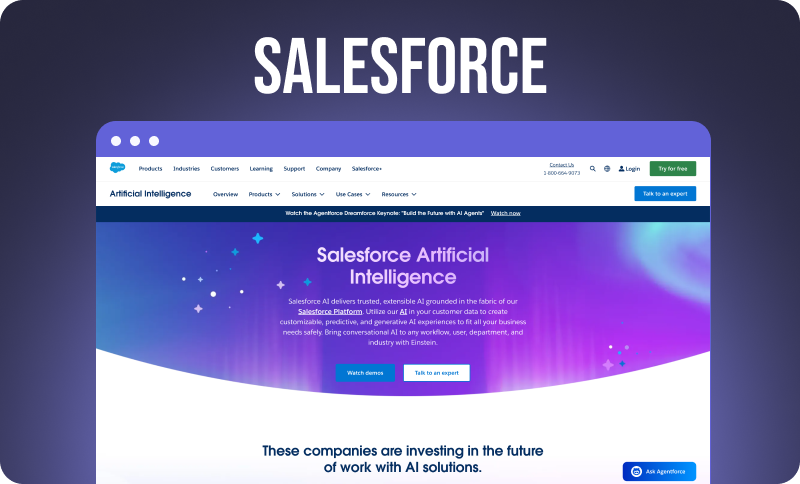
Salesforce Einstein is an AI-enhanced extension of the Salesforce CRM suite. It also employs machine learning to provide intelligent information, simplify significant operations, and enable companies to enrich sales, marketing, and service activities.
Salesforce Einstein has been lauded for its natural fit within the Salesforce ecosystem. For several years, it’s been consistently recognized as a Gartner Magic Quadrant Leader company in CRM and is relied upon by more than 150,000 businesses worldwide. The platform’s AI strength continues to develop, establishing Salesforce as a prominent player in the AI CRM ecosystem.
Benefits:
Machine learning algorithms: They develop predictive algorithms to process data and give each a personal insight.
Natural Language Processing: Powers the kind of customer query understanding and sentiment response possible with Einstein.
Automated data tracking and updating: This system tracks and automatically updates customer communication in real time, avoiding all the manual data tracking that generally occurs.
Lead scoring with AI: Leads are ranked based on their conversion probability and automatically added to the sales team’s “high-potential” leads list that is most likely to convert.
Deep analytics and reporting: Offers AI-enhanced dashboards and reporting with actionable analytics from sales data.
Disadvantages:
Steep learning curve: Requires extensive customization and training.
High cost: AI features for these systems cost more money while remaining unaffordable to small company budgets.
Resource-heavy implementation: Setting up and sustaining this system requires substantial IT resources.
2. HubSpot CRM

HubSpot CRM enjoys an intuitive design, and its customer experience is supported by AI features that can maximize customer interactions, marketing efficiency, and sales workflows.
With over 100,000 customers, HubSpot CRM remains one of the most in-demand products for SMEs. It has been declared one of the Top CRM Providers and commended for helping companies expand through free tools and top AI features.
Benefits:
Predictive lead scoring: Using historical information and engagement metrics, a model is developed to predict which leads will likely close.
Workflow automation: Simplifies marketing and sales processes like email sequences, lead warming, and assignments using AI-driven rules.
AI chatbots: Offers 24/7 customer support through chatbots that utilize NLP to answer questions and qualify leads.
Smart email campaigns: AI in CRM personalizes email content for each user interacting with the email.
Data enrichment: Automatically enriches contact profiles with corresponding information from social and other web sources.
Disadvantages:
Limited AI capabilities: Enterprise-level CRMs possess superior AI capabilities compared to their basic AI features.
Feature restrictions in the free plan: The system redirects most users toward premium versions because these contain superior AI functionalities.
Lacks deep AI-driven analytics: Large-scale enterprises should consider alternatives because Zoho CRM provides insufficient simplified capabilities for extensive operations.
3. Zoho CRM
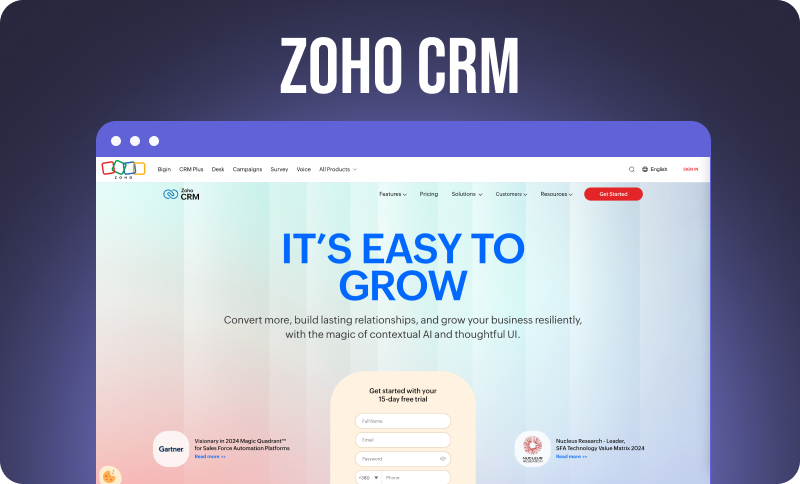
Zoho CRM leverages its artificial intelligence assistant, Zia, to simplify routine responsibilities and offer useful and insightful tasks. It is robust and comprehensive, enhancing commercial sales, marketing, and customer service roles with a data-driven focus.
Zoho CRM has collected many industry awards for its AI-driven functionalities, such as “Best CRM for Automation” by the 2024 CRM Excellence Awards. It is employed by over 250,000 companies worldwide and is also gaining traction in countries including India and North America.
Benefits:
Zia AI assistant: This tool offers predictive analytics of sales patterns, lead scoring, and personalized recommendations derived from historical data sets.
Sentiment analysis: This involves analyzing customer interactions (emails, chats, etc.) to gauge customer attitudes and assist sales teams in adjusting their tactics.
Workflow automation: This process digitizes various functions, including email reminders, data entry, and AI task control, through triggers.
AI sales forecasting: Applies machine learning models to forecast sales results and inform the strategy.
Deep analytics: Provides AI-powered reports and dashboards to enable businesses to monitor performance and continuously improve decision-making.
Disadvantages:
AI assistant Zia is paywalled: Available only in premium plans.
Cluttered interface: Extensive features presented in the system create complex navigation issues.
Fundamental sentiment analysis: The system performs poorly when identifying customers’ complex emotional states.
4. Pipedrive

Pipedrive is a cloud-based CRM for sales teams that effectively manages and closes sales. Its capabilities are at the forefront of application and deliver actionable intelligence and efficiency in the sales pipeline.
Pipedrive has received several Product of the Year awards, and its AI-enhanced functionality is still met with great acclaim as a tool that helps teams win more deals faster. It’s consistently growing, with over 95,000 companies globally using the platform, particularly in the SaaS and tech sectors.
Benefits:
AI sales assistant: Categorizes historical deal information to provide insights and simplify follow-up reminders based on customer activity.
Predictive sales analytics: AI models forecast deal success, enabling sales teams to focus on the most promising leads.
Customizable pipelines: Users can set up Pipedrive pipelines according to their own sales process, and AI offers insights into where deals may get stuck.
Automated workflow: It simplifies monotonous assignments such as sending emails, saving meetings, and recording customer experiences.
Deal health score: The AI assigns each deal a score based on its probability of closing so that sales teams can prioritize efficiently.
Disadvantages:
Sales-focused CRM: Lacks broader marketing and customer support functionalities.
Limited AI automation: The system lacks the extensive simplified features that characterize elite enterprise CRMs.
Essential reporting tools: The current analysis capabilities need improvement when companies seek to base decisions on data.
5. Freshsales
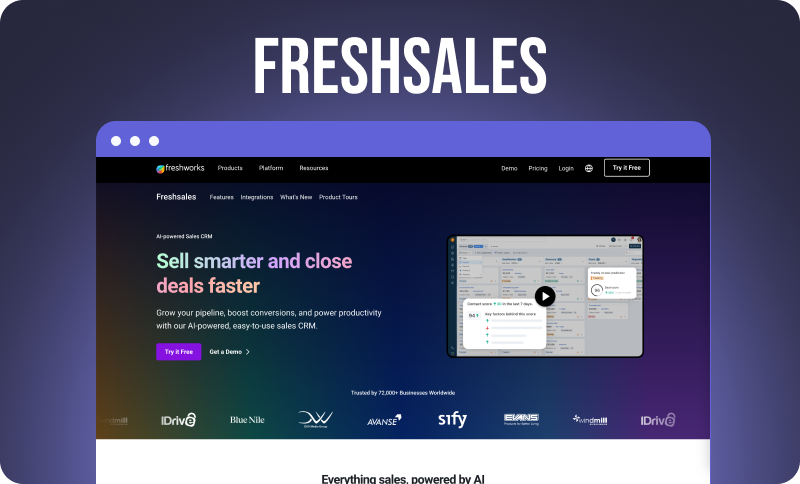
Freshsales is an AI-based CRM that enables businesses to optimize and accelerate their lead management and sales processes and deliver personalized customer interactions.
Freshsales has been acclaimed in Best CRM Software awards by several independent platforms based on the simple interface and powerful Freddy AI feature set that small- to mid-market companies enjoy.
Benefits:
Freddy AI assistant: Streamlines lead scoring, data entry, and allocation assignment by leveraging machine learning to forecast the likelihood of lead conversion.
AI email tracking: This tool analyzes email responses and engagement metrics to determine the best time to follow up with leads.
Lead scoring: Estimates lead conversion likelihood based on historical behavior, customer interaction, and demographics.
Sales forecasting: This process applies AI models to forecast trends and sales results, given historical data and the current activity pipeline.
Real-time alerts: Streamline alerts and notifications for customer interaction or changes to the sales pipeline.
Disadvantages:
Less advanced AI tools: AI capabilities in Freshsales operate less efficiently than those found in Salesforce CRM systems.
Limited third-party integrations: The application provides restricted integration possibilities with outside company tools.
AI lead scoring requires fine-tuning: May need adjustments for accuracy.
6. Microsoft Dynamics 365
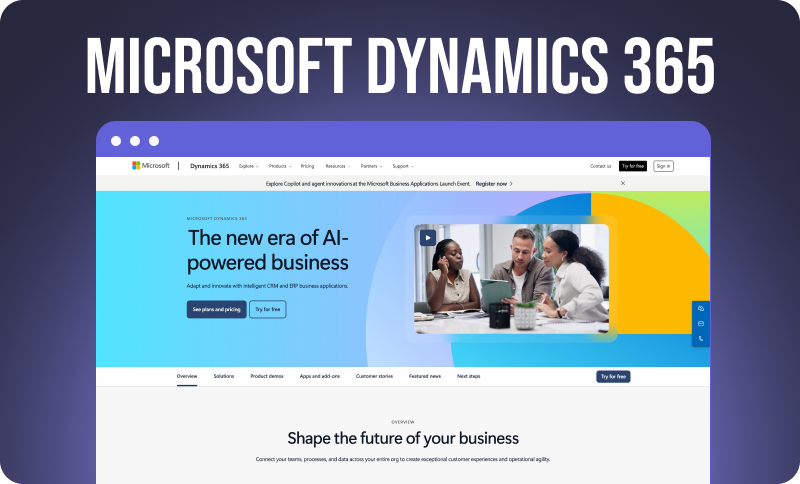
Microsoft Dynamics 365 combines CRM and ERP capabilities with AI intelligence to help with customer interaction, streamline business processes, and provide actionable insights.
Major players in the market have embraced Microsoft Dynamics 365, which has received numerous Partner of the Year Awards for its flexibility, scalability, and business optimization. Driven by the power of AI, these enterprises can optimize the operations of multiple departments.
Benefits:
AI insights: Deep learning and machine learning are applied to Azure AI to provide deep customer behavior, preference, and trend insights.
Predictive sales analytics: Makes data-driven recommendations and forecasts future sales results using history and customer behavior.
Sentiment analysis: Analyzes customer interactions to determine their emotional tone, allowing businesses to adapt their approach.
Process automation: This involves automating processes like lead assignment, follow-up scheduler/reminder, and data entry using AI-based workflows.
Integrating AI with Microsoft Tools: This gives a single CRM experience that works tightly with other business apps, including Microsoft Office 365, LinkedIn, etc.
Disadvantages:
High price tag: Expensive and complex licensing structure.
Overwhelming AI automation: Requires training to utilize effectively.
Performance issues with large datasets: The system performs at a normal pace during massive data processing operations.
7. Creatio
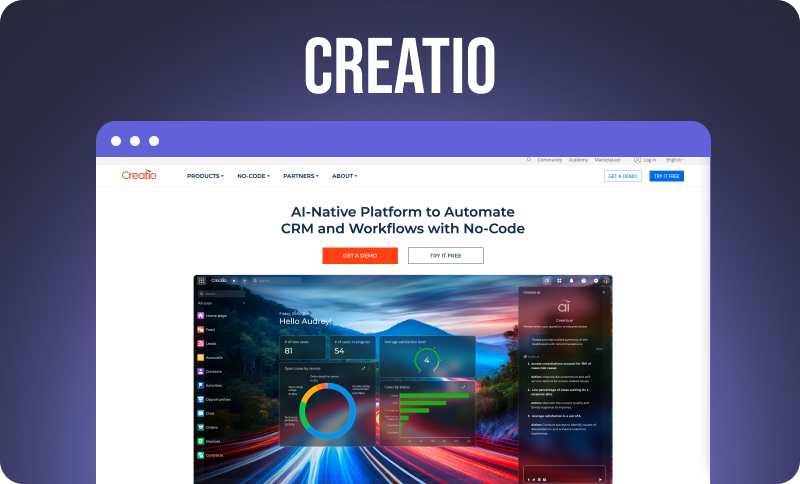
An intelligent platform for CRM and process automation combining deep data analysis and clever insights, Creatio fixes customer issues faster through better CRM and process automation with AI.
Additionally, Creatio received many awards in 2024 at the Automation Excellence Awards. It is becoming increasingly popular in business domains such as finance, healthcare, and manufacturing, where deep process customizations are required.
Benefits:
AI sales forecasting: Applies machine learning to forecast sales trends, detect high-value prospects, and increase pipeline completeness.
Intelligent process automation: Simplifies customer journeys, from top-of-the-funnel lead acquisition to post-acquisition follow-up through AI-powered triggers and workflows.
Customer data enrichment: Utilizing AI on various sources automatically enriches customer profiles with helpful information.
AI algorithms: They analyze and predict customer behavior, enabling the creation of more effective marketing campaigns.
Low-code customization: Creatio’s low-code platform allows its users to customize and integrate the workflow with minimal technical expertise while leveraging AI capabilities.
Disadvantages:
Evolving AI features: Existing competitors have gained more maturity over their AI tools.
Technical expertise required: Advanced customization needs coding knowledge.
Steep learning curve in process automation: Learning to operate automated systems that use artificial intelligence demands significant time.
Conclusion
Many businesses identify AI-powered CRM solutions as essential tools when customer relationship management undergoes its AI-driven evolution. Implementing CRM platforms enables companies to boost their sales revenue by 21-30%. The tools bring transformative changes to both sales processes and customer interactions, as well as decision-making simplification, which helps businesses dominate competitive markets.
The suitable AI CRM software for your business will depend on your business needs, size, and the required level of AI functionality. An AI CRM solution is available to cater to your goals: to automate routine duties, gain a deeper insight into customer behavior, or improve customer satisfaction.
Integrating AI into your CRM brings a tool, but more than that, it integrates your business for a more prosperous future of customer engagement and sales excellence.
Geniusee presents expertise in implementing AI solutions to take CRM systems to advanced levels. Geniusee provides specialized AI CRM solutions that optimize business operations and deliver improved customer interactions and greater sales performance results. Contact us immediately to learn how we can assist you in utilizing AI to improve your CRM strategy and produce better results!





















